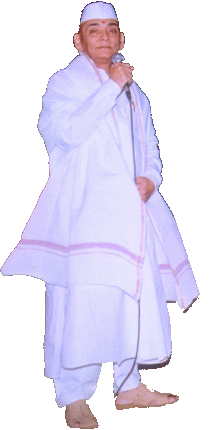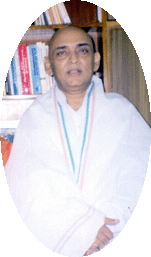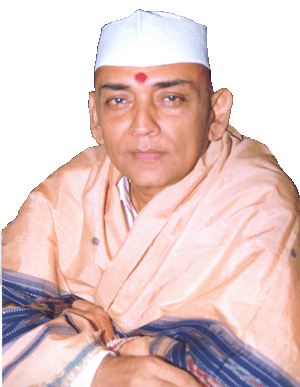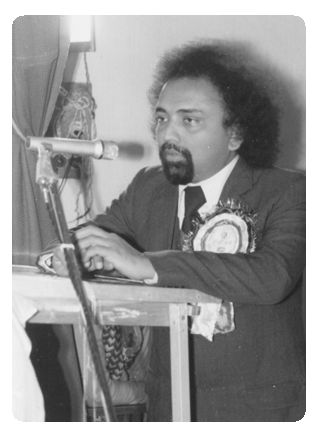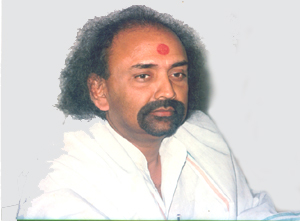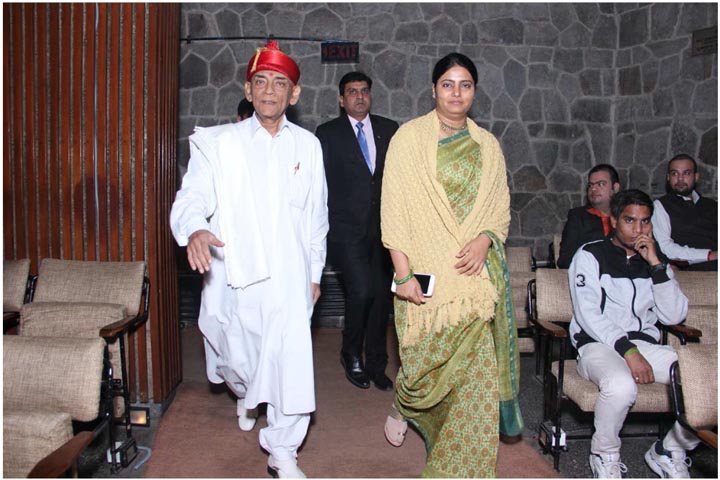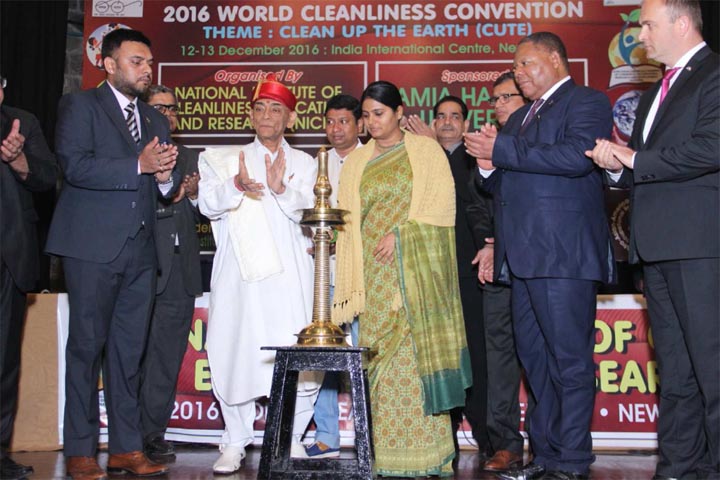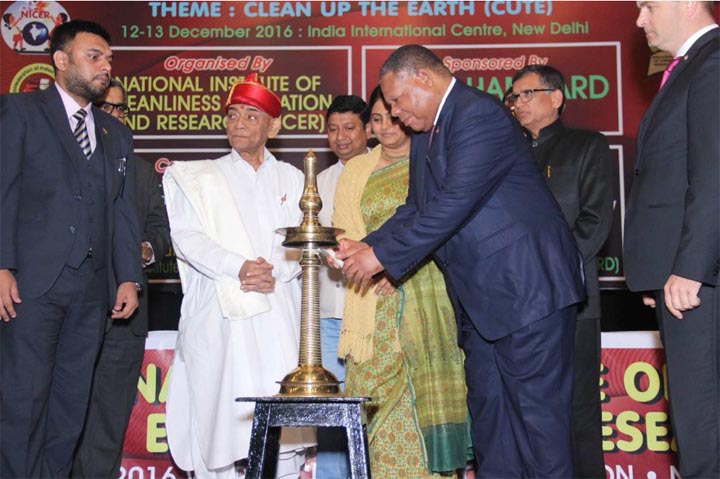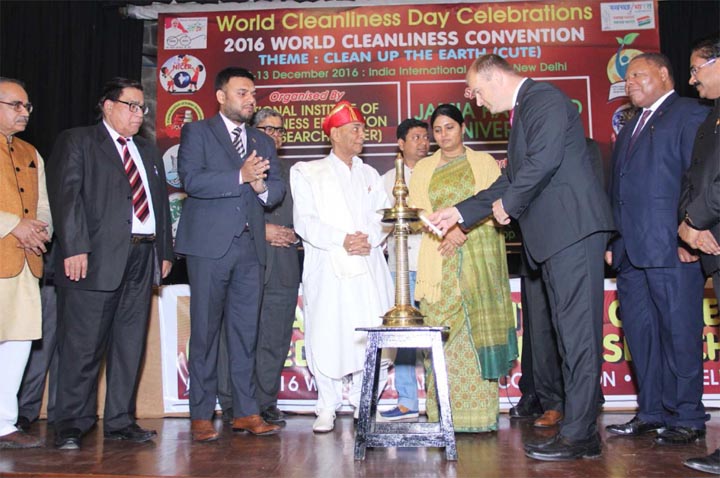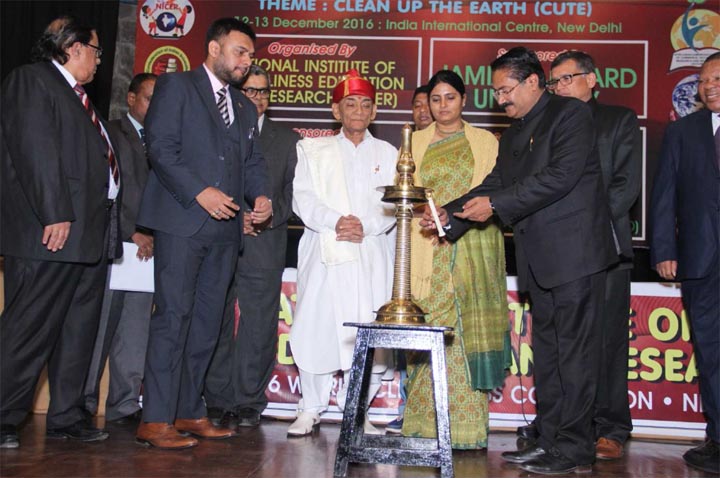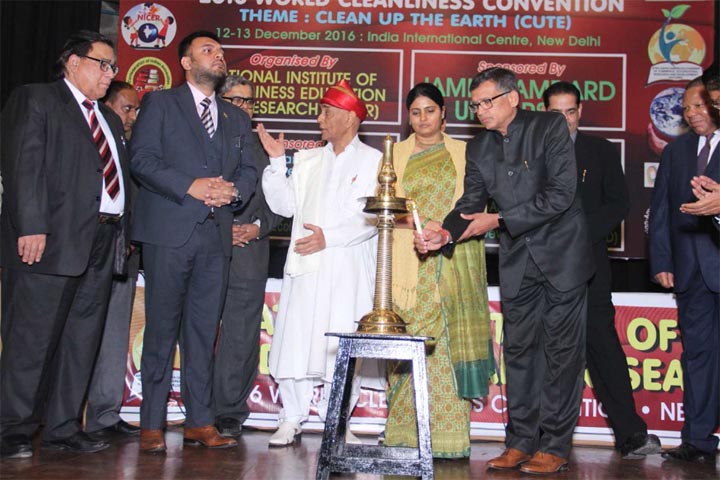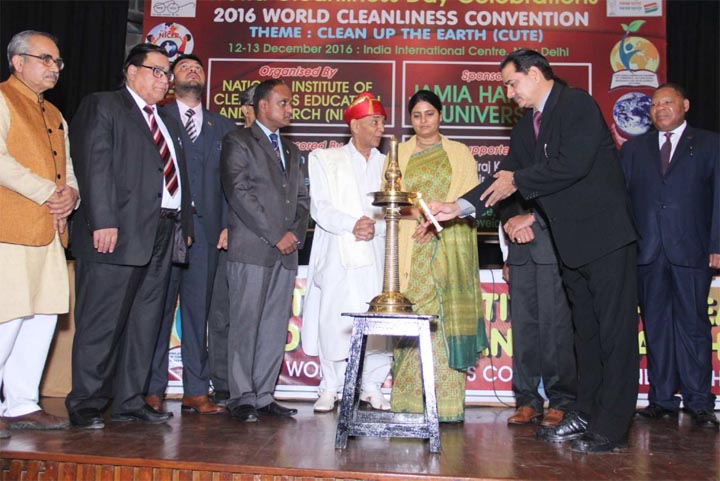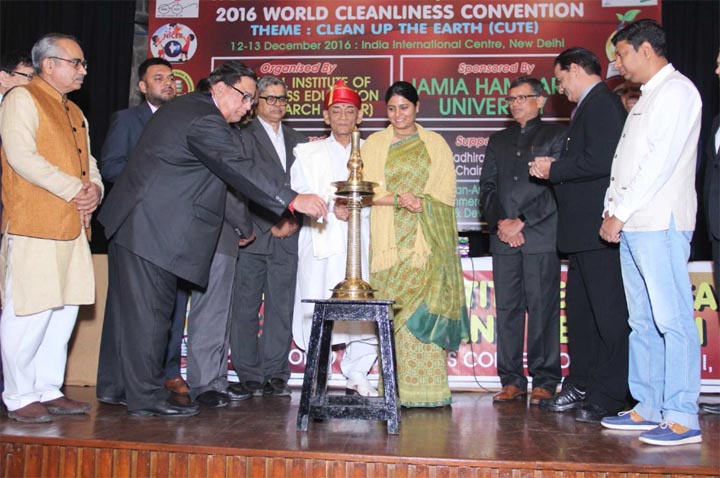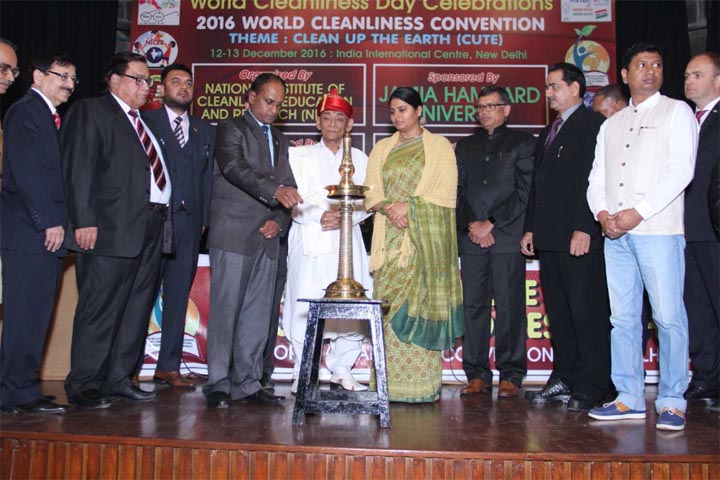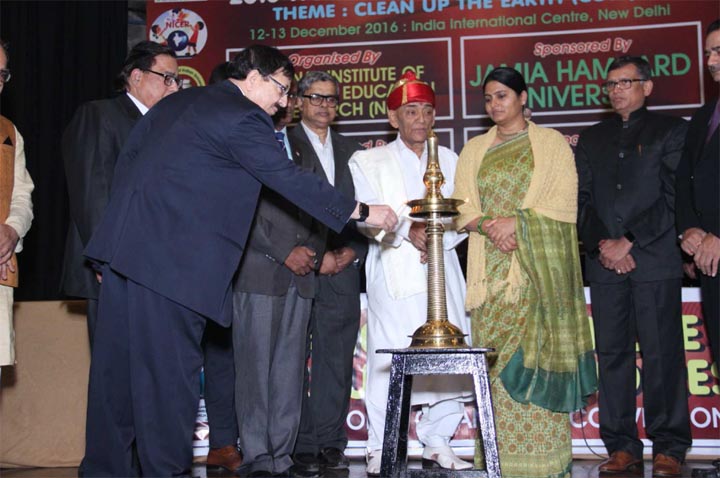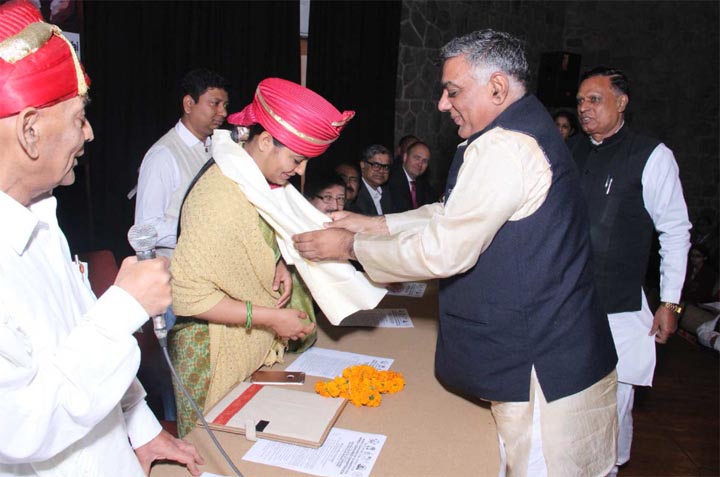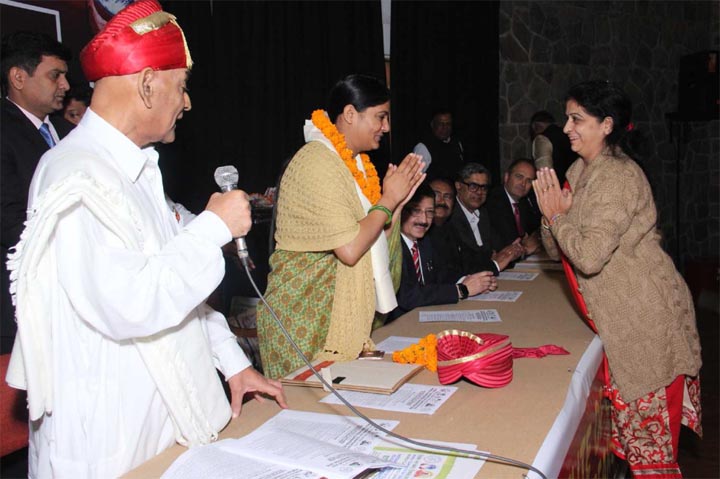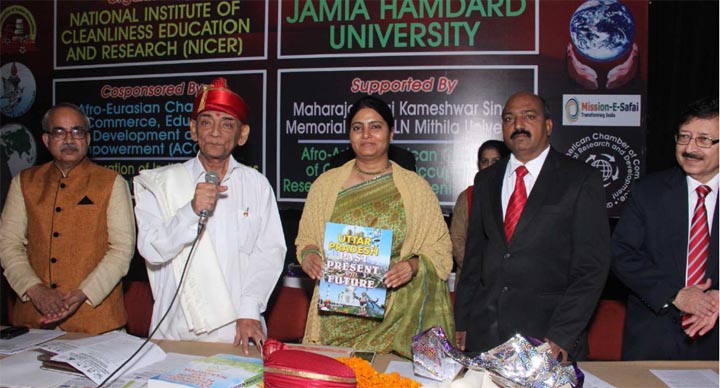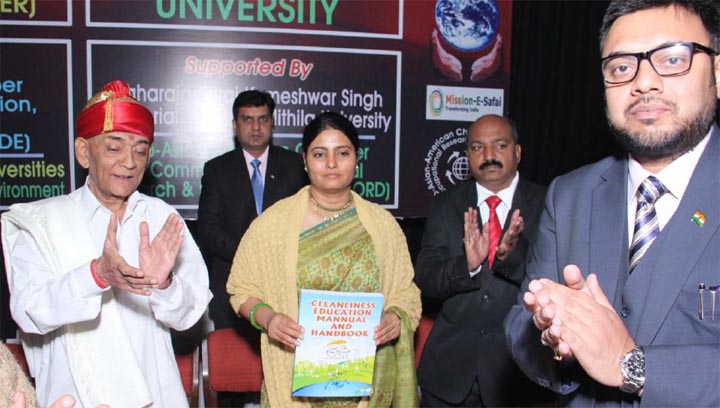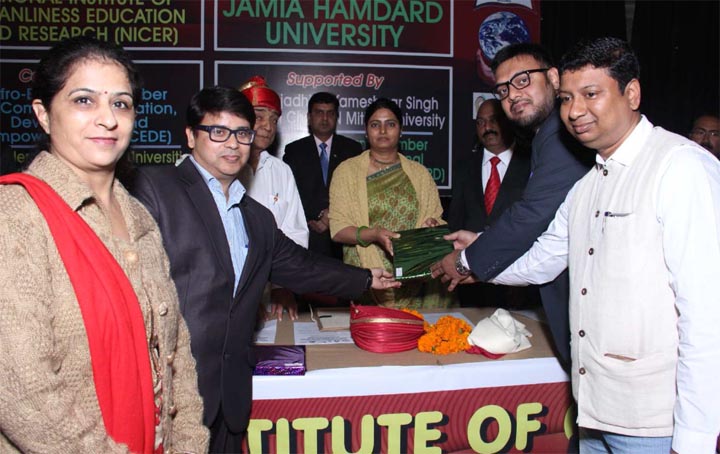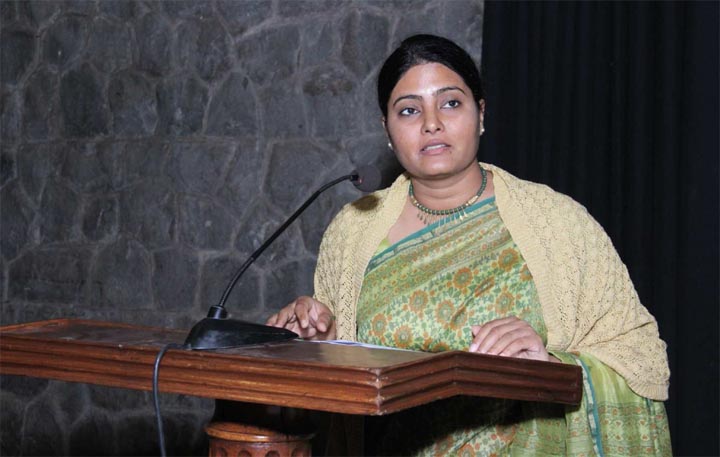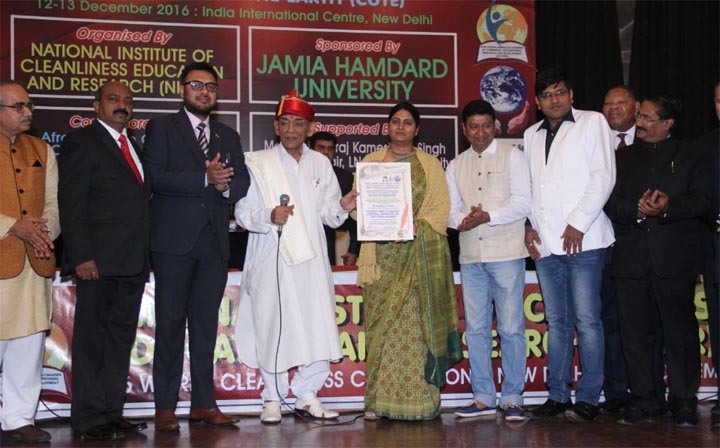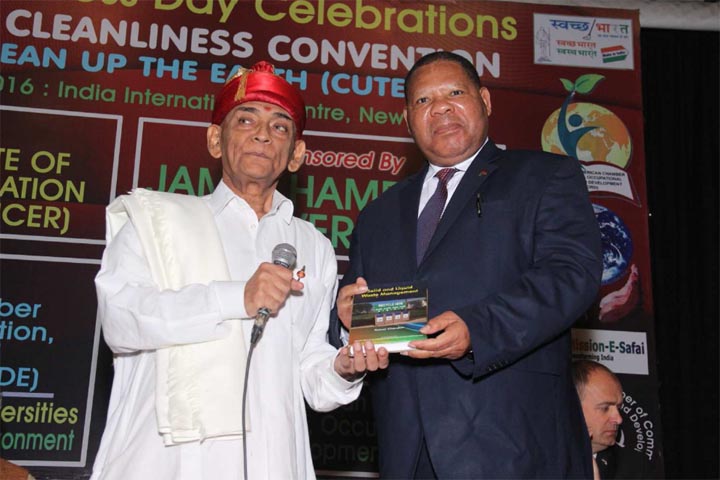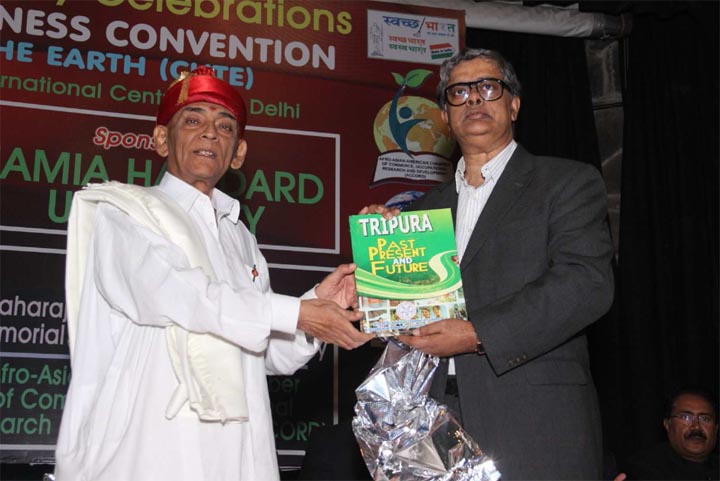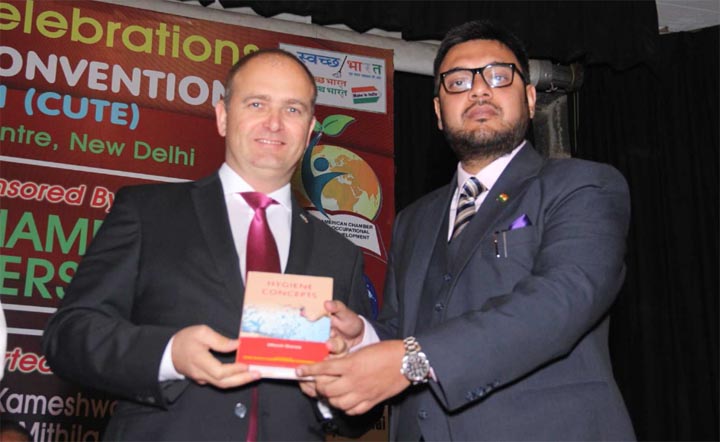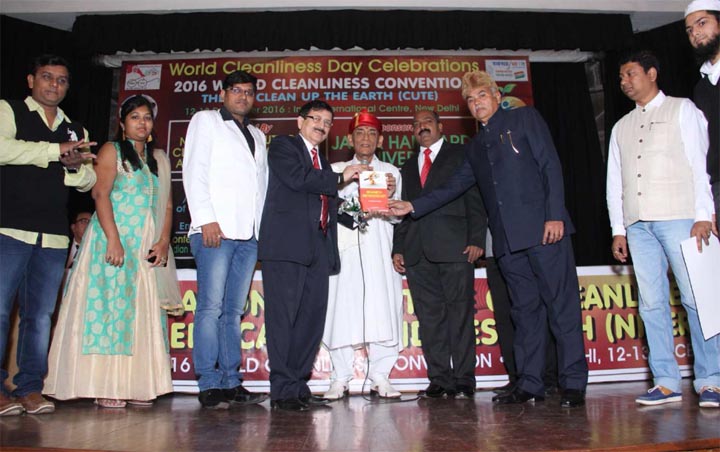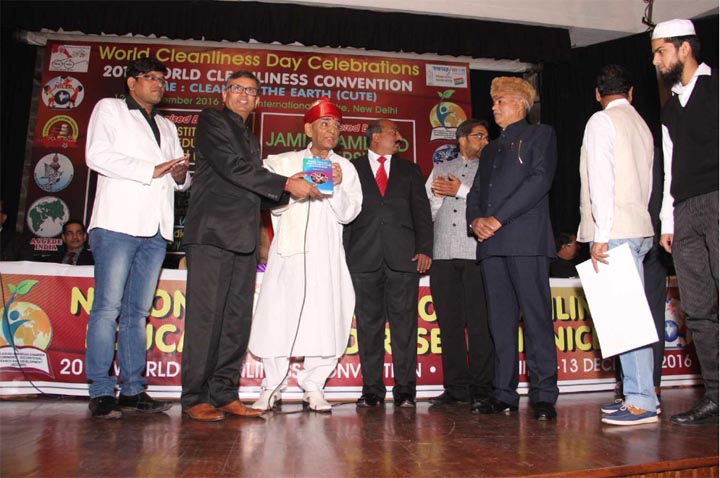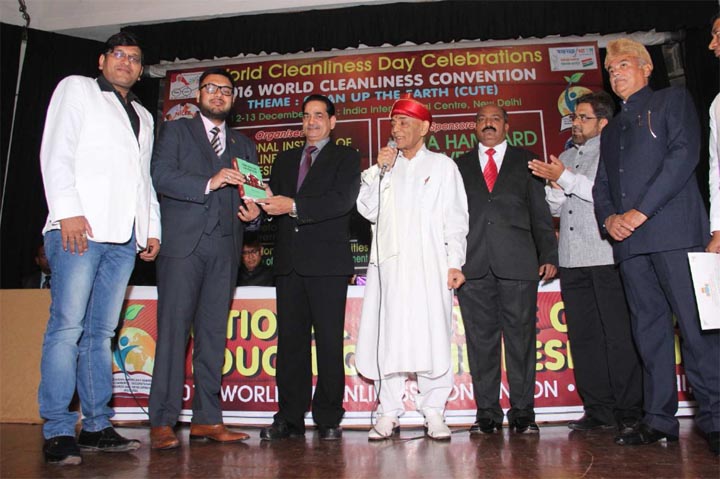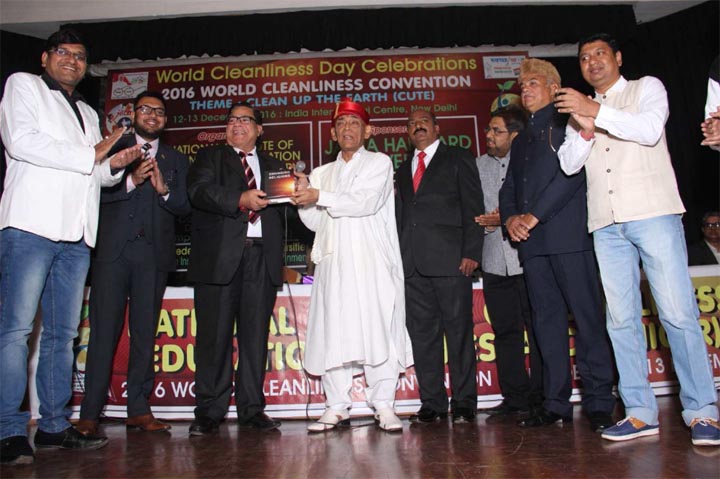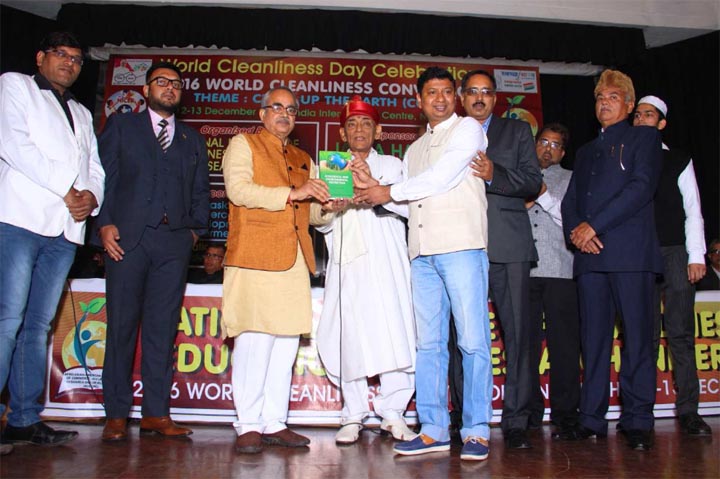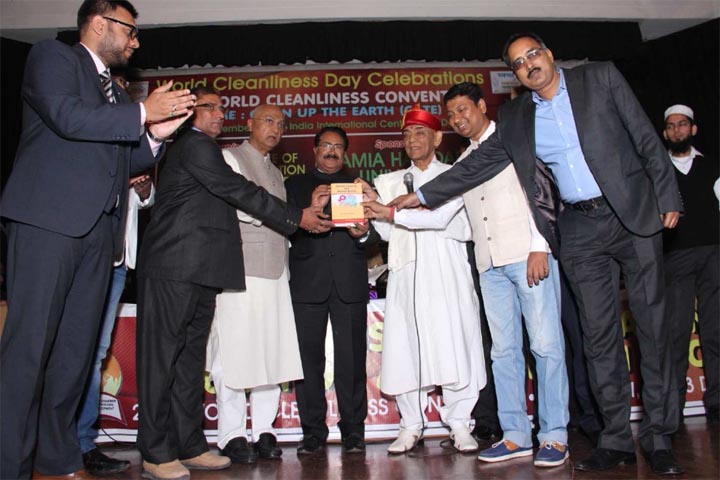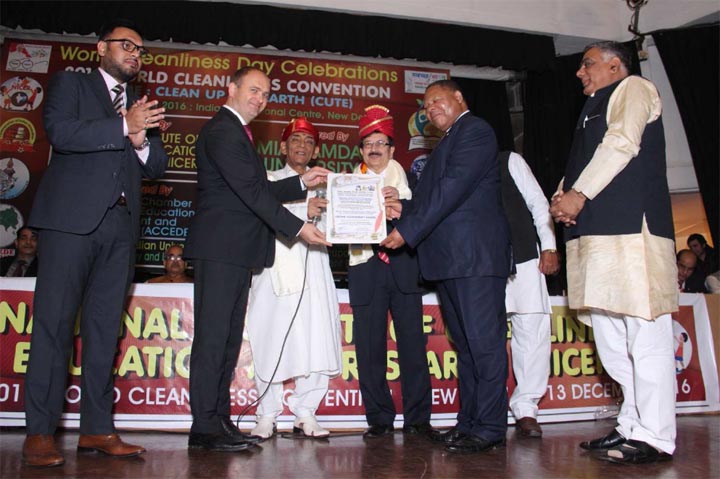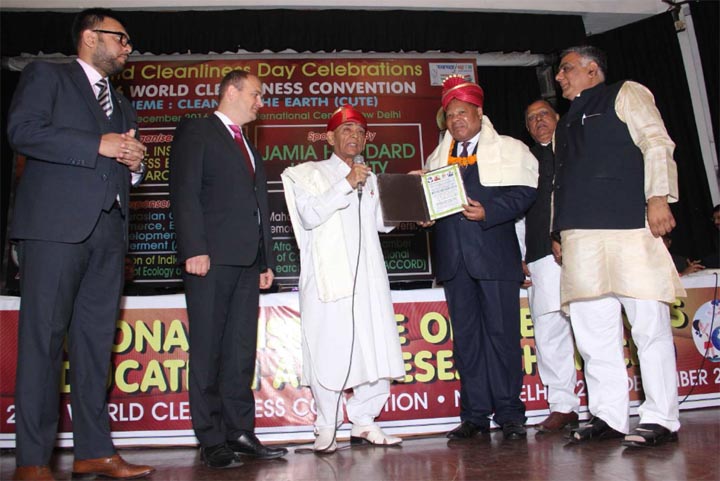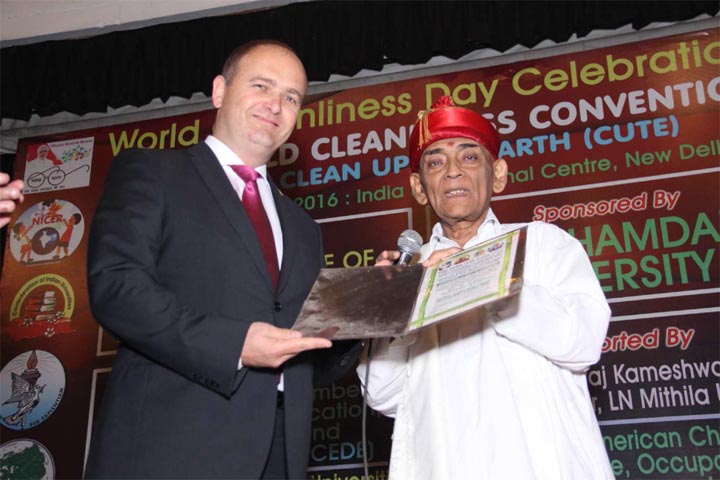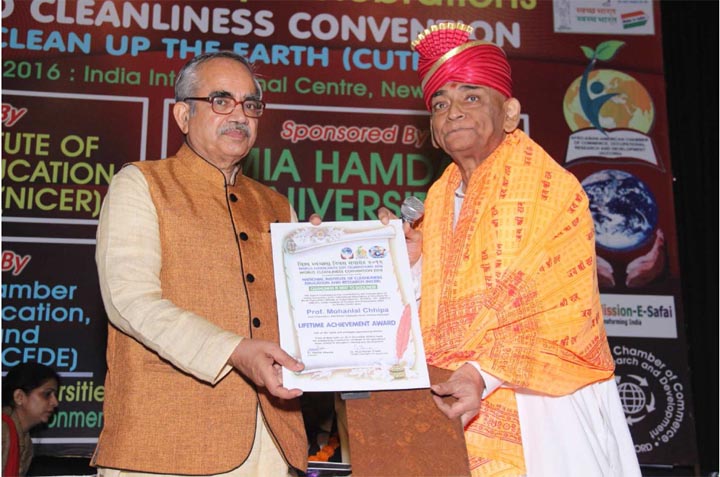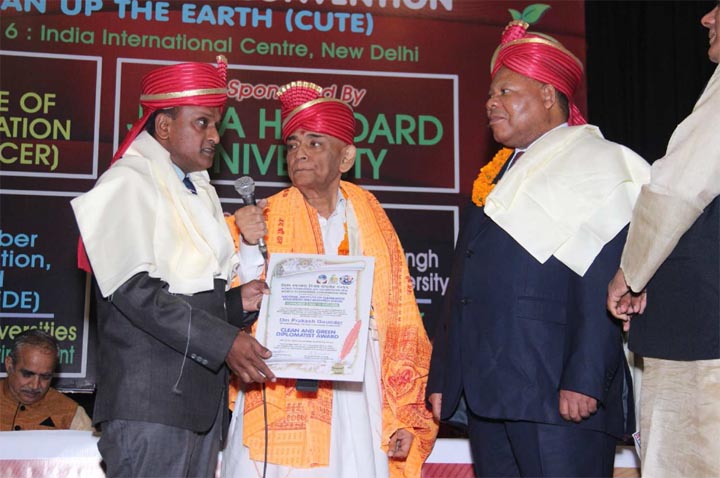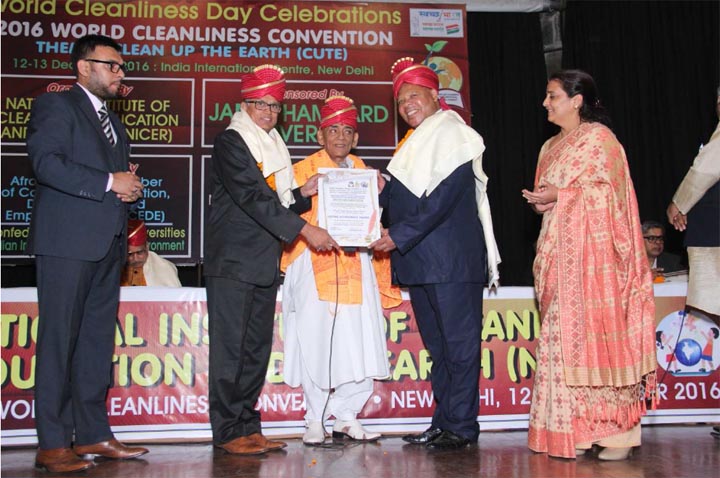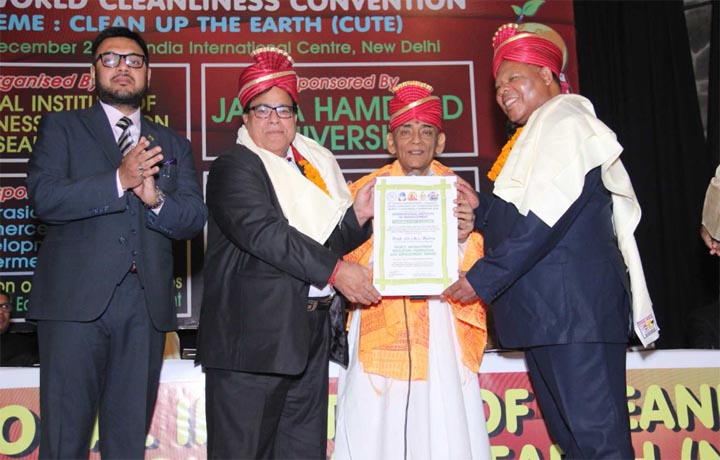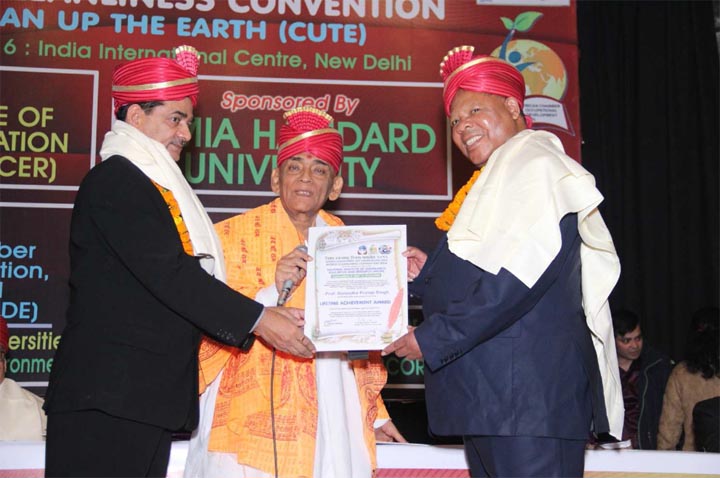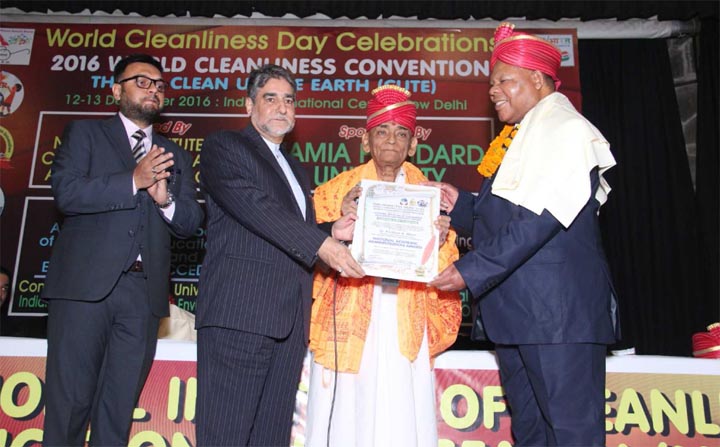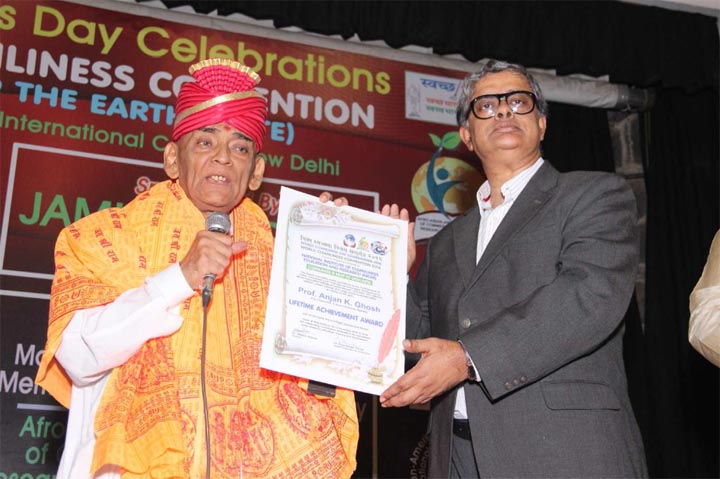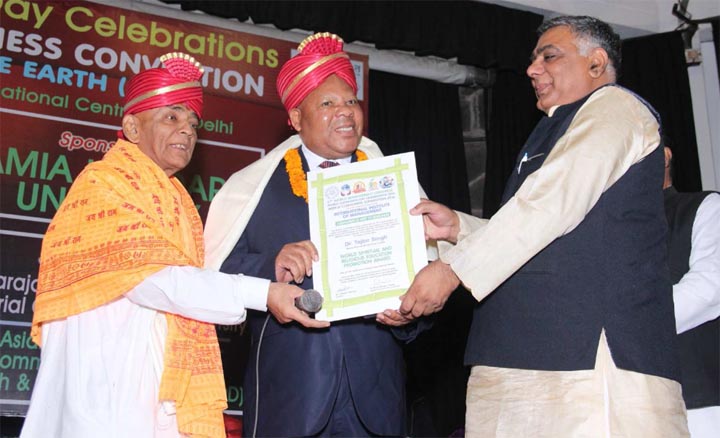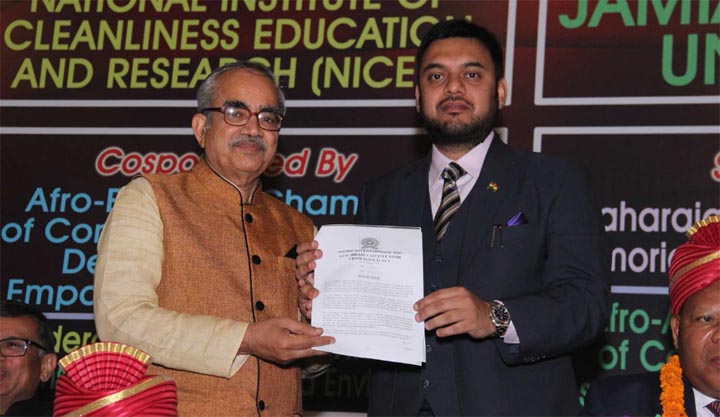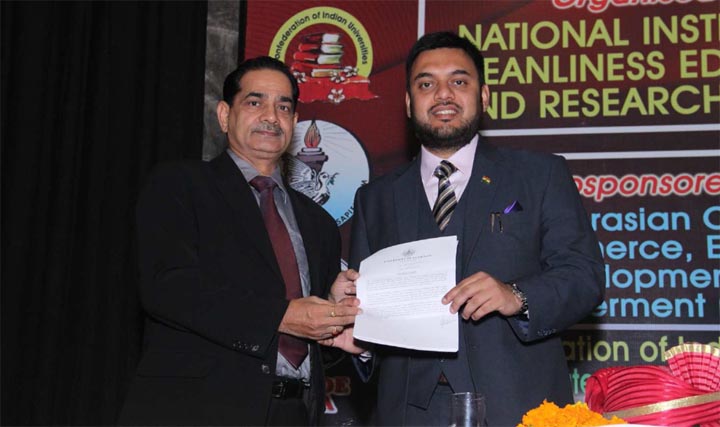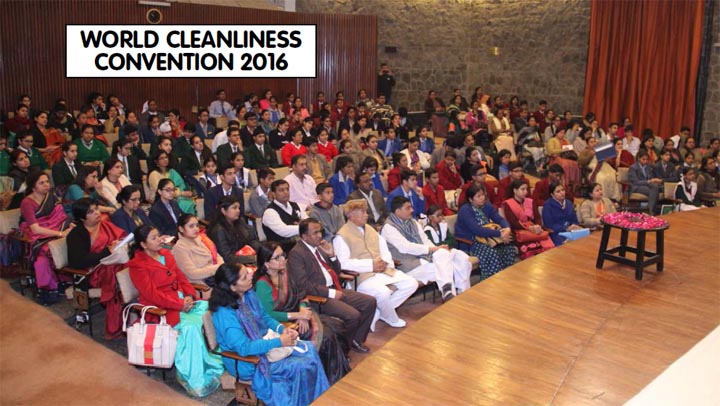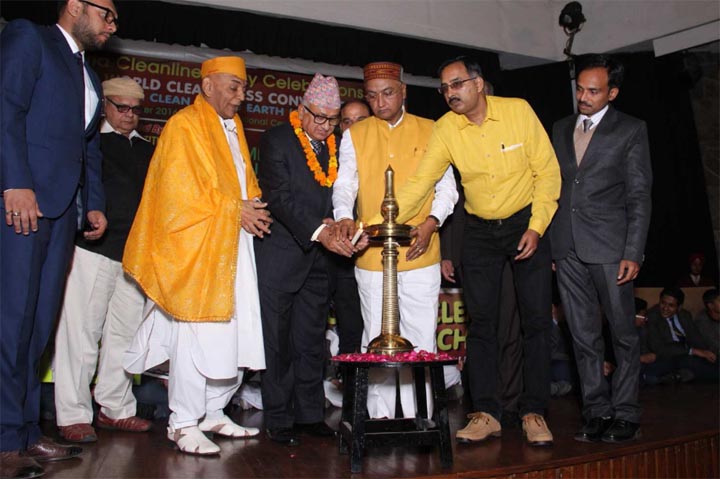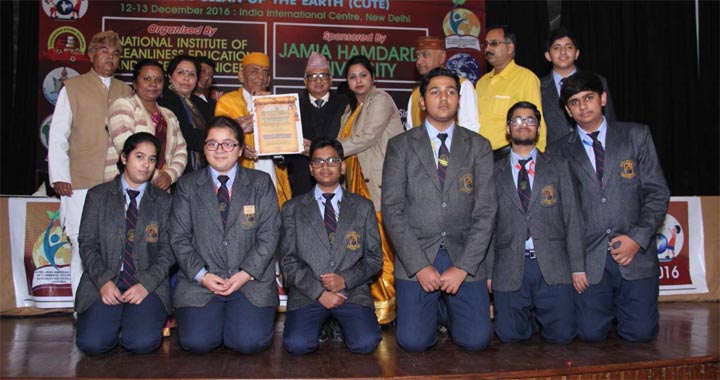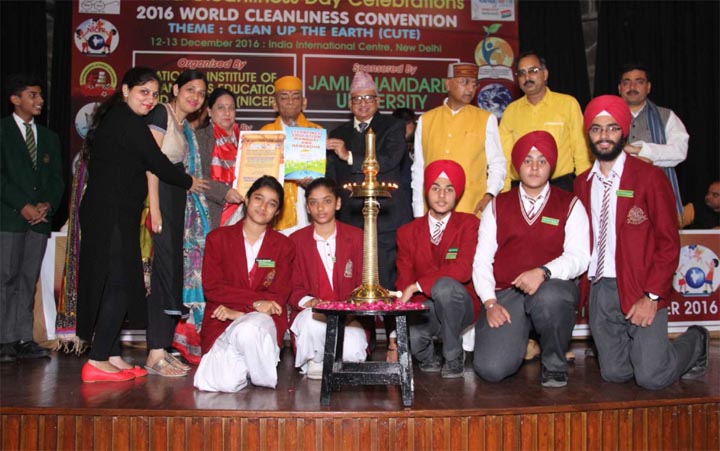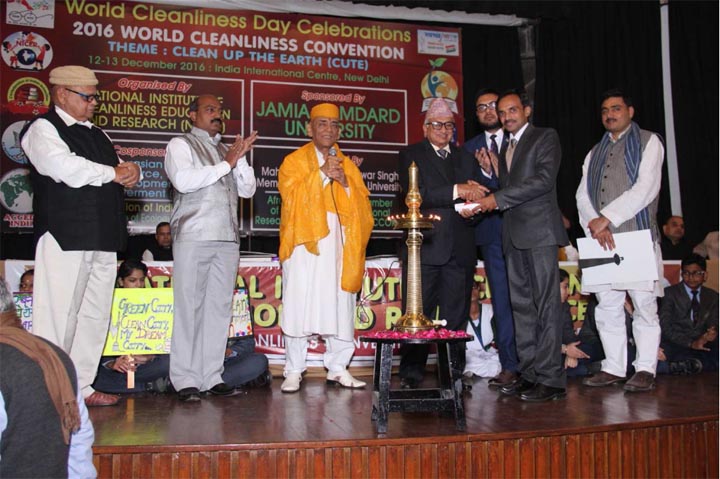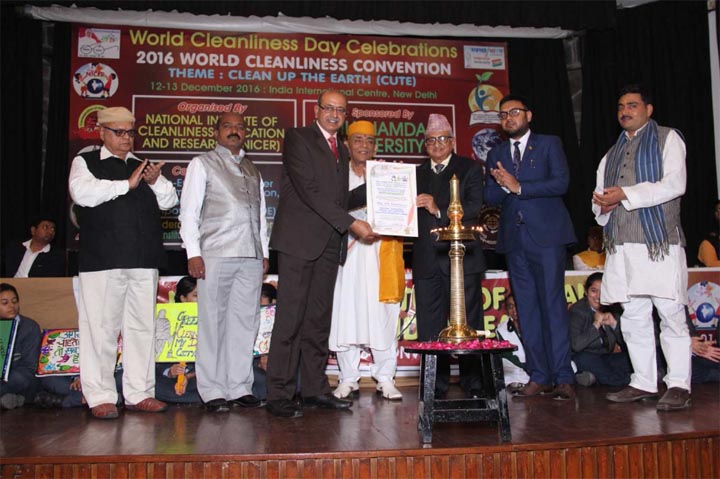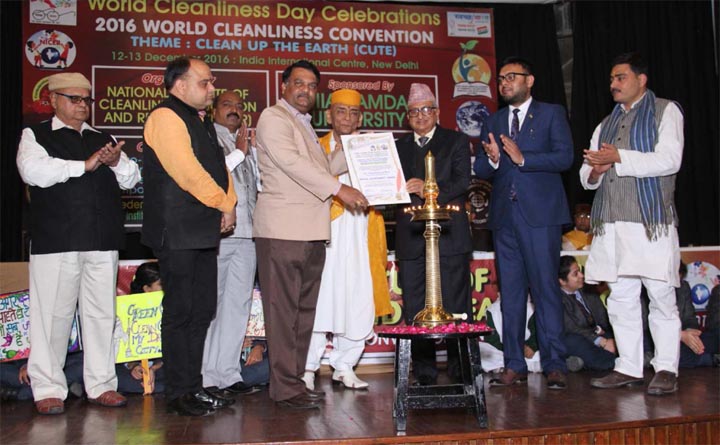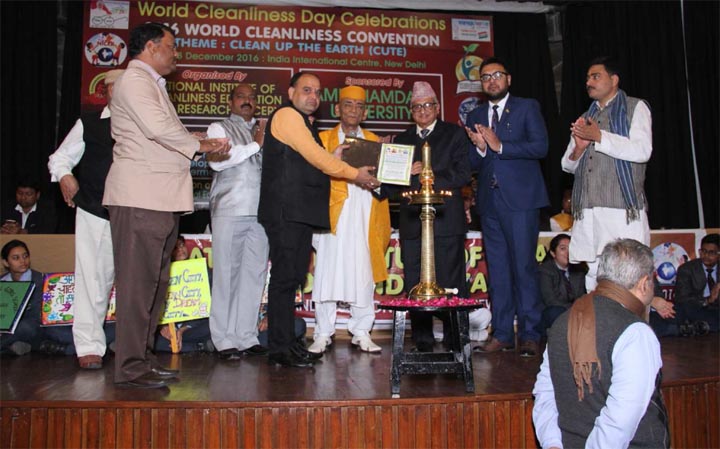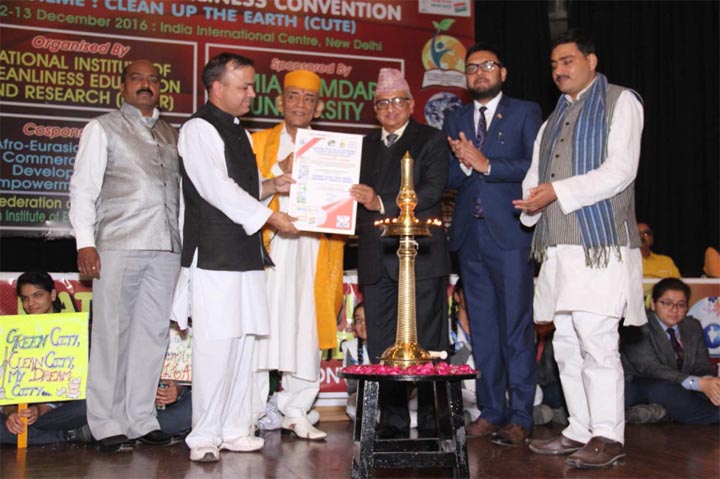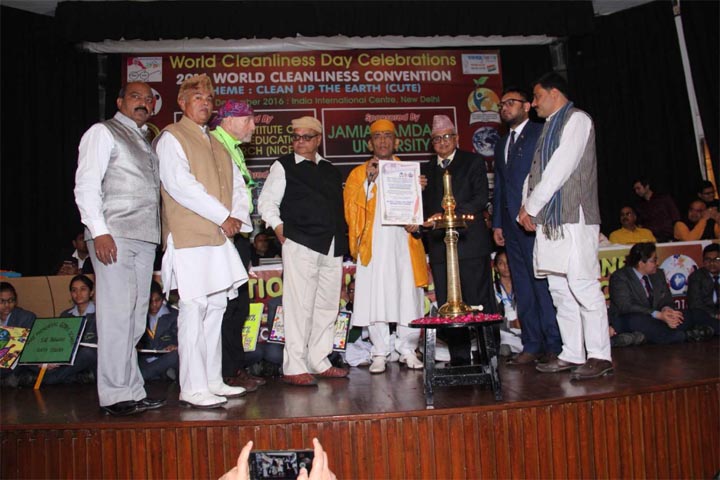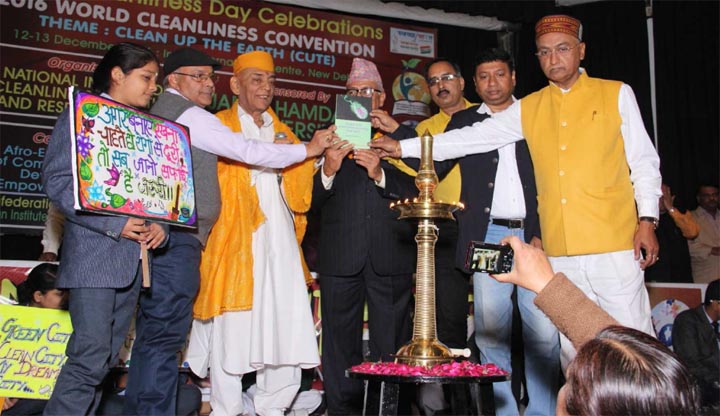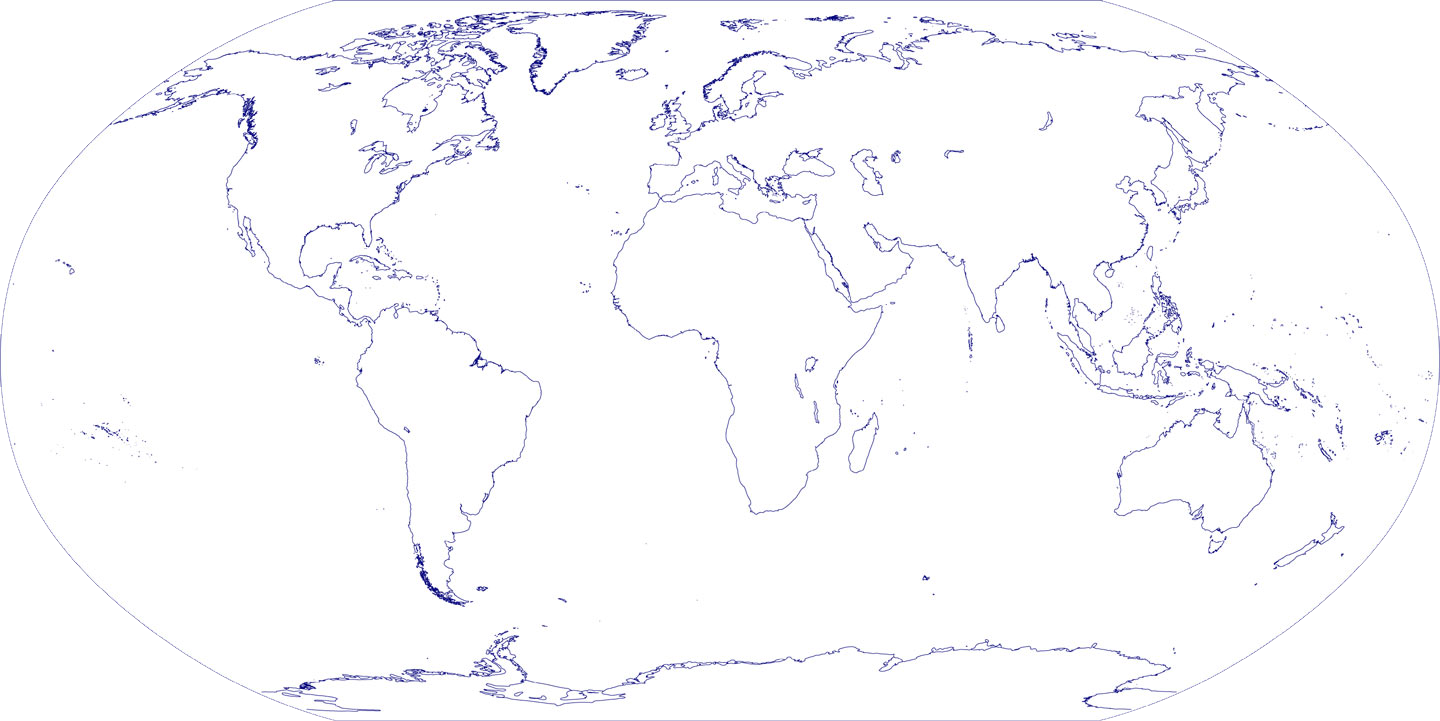INSIST |
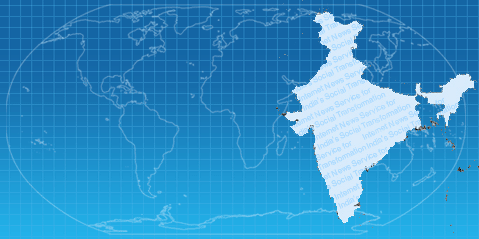 |
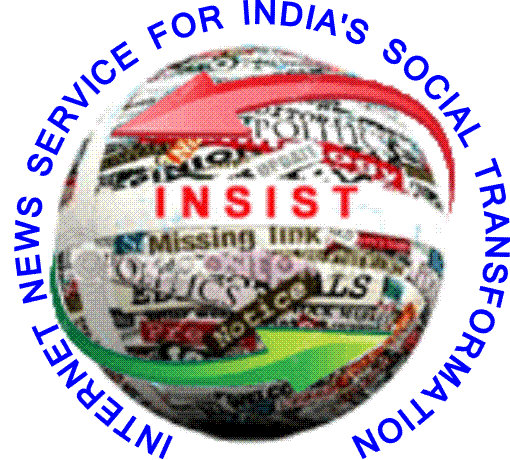 News and Press Release News and Press Release
Internet News Service for India's Social Transformation (INSIST) has been established by leading intellectuals, social scientists, policy makers and educators with a view to propagating news relevant to education and national development. Different types of news, notifications and releases are put on this website. Click any news |
|
|
New Delhi,
12th December 2016
|
|
|
The Union Minister of State for Health and Family Welfare, Government of India Ms. Anupriya Patel while inaugurating the 2016 World Cleanliness Convention advocated among the policymakers, diplomats, academicians, students and activists to design and implement cleanliness friendly activities with a view to giving a boost to the Swachchh Bharat Abhiyan launched by the Hon’ble Prime Minister of India Narendra Modi.
She thanked the National Institute of Cleanliness Education and Research (NICER) for working day and night in association with the Confederation of Indian Universities (CIU), the Afro-Asian-American Chamber of Commerce, Occupational Research and Development (ACCORD) and Jamia Hamdard University for monitoring and evaluating the Swachchh Bharat Abhiyan implementation schedule in the schools, colleges and universities.
She further added that she has been keenly interested in the fields of cleanliness, hygiene and sanitation since her childhood. Even during my college and university education and training, she had been stressing on the urgent need of bringing cleanliness in the family and at home by empowering all the family members specially the women.
The Union Minister of State for Health and Family
Welfare Hon’ble Smt. Anupriya Patel
She was also overwhelmed to know from the organisers that 51 reputed universities of our country had joined hands under G-51 (Group of 51 Universities for bringing awareness regarding Cleanliness, Hygiene and Sanitation Education - CHASE) in all States as well as Union Territories. I am sure that the remaining universities, colleges and schools will get proper guidance from G-51 for implementing Swachchh Bharat Abhiyan in an optimum manner.
She also released two important Manuals and Handbook namely "Swachchh Bharat Vishwakosh" and "Cleanliness Handbook and Manual". She admired the hard work put in by the authors, editors and contributors in this important publication.
She lauded the efforts of CIU and NICER for jointly publishing the 11 Volume World Encyclopaedia of Cleanliness, Hygiene and Sanitation Education (WE-CHASE).
While appreciating the publications she said that the topics included for training among the young boys and girls specially in the specialised areas of Cleanliness; Hygiene Concepts; Sanitation Education; Public Health; Solid and Liquid Waste Management; Water Quality Monitoring and Surveillance; Ecological and Environmental Protection; Water and Sanitation related Diseases; Gender Equality and Human Rights etc. will go a long way in making a cleaner and greener country in general and our schools, colleges, universities, temples, gurudwaras, mosques, churches, offices, rivers, ponds, mountains, industries more cleaner by also providing training in the areas of attitudinal and behavioural change among the Indian as well as the world citizenry.
The High Commissioner of Malawi lighting the lamp on 12 December 2016.
She further explained while observing the delegates that many school children accompanied by their teachers in this auditorium as they have come to get felicitated for their active participation in the cleanliness related activities at their respective schools. She congratulated each one of them and she was confident that these school children will finally become change agents for making the entire country more cleaner.
She also thanked the National Institute of Cleanliness Education and Research for their slogan "Catch Them Young" and hoped that the idea was to catch the children young so that they could become didactics and educators to finally educate and guide their fathers, mothers, teachers, guardians, colleagues and rather the entire neighbourhood.
While connecting this movement to her Ministry she said that cleanliness has a direct bearing on my Ministry of Health and Family Welfare as there can be an immediate control on diseases the movement we learn as to how to remain cleaner with proper hygiene and sanitation.
The Ambassador of Estonia lighting the lamp on 12 December 2016.
She also discussed that her ministry had already asked the States to work resolutely on improving cleanliness at all levels. The State Governments have been informed that the Ministry of Health and Family Welfare would be supporting the States in their endeavours and accordingly two hospitals in large States would get cash awards of Rs. Fifty Lakhs for the Best Hospital and Rs. Twenty Lakhs for the runner-up award. The Best District Hospital in a small States would be awarded Rs. Fifty Lakhs. These awards have been instituted by the Ministry of Health and Family Welfare under the Swachchh Bharat Abhiyan launch by our Prime Minister on 2nd October 2014 to focus on promoting cleanliness in public places.
She further elucidated that the Ministry of Health and Family Welfare had also launched a national initiative for awards to Swachchh Public Health facilities on 15 May 2015 under the National Health Mission for promoting a cleaner environment in public health facilities which are essential to the dignity, comfort and speedy recovery of the patients.
She said that her Ministry had also issued Swachchh Hospital Guidelines by laying out the protocol and processes for maintaining cleanliness and hygiene at public health facilities. Guidelines containing protocols for objective assessment of health facilities allowing for comparison of two or more health facilities within a District or State for the purpose of giving the Awards. The idea is to help improve public health facilities to attain National Quality Standards pertaining to cleanliness.
The Vice Chancellor of LNMU, Darbhanga lighting the lamp on 12 December 2016.
Talking of employability research she said that these days everybody was talking about the problem of unemployment and that is why the need for employment generation. She wanted to must tell the audience that there were millions of jobs in the areas of cleanliness, hygiene and sanitation. The need is to vocationalise these careers by launching employment centric training programmes in the areas of cleanliness, hygiene, sanitation, garbage, solid and liquid waste management, hazardous waste management, hospital waste management, recycling, alternate energy resource development from human wastes etc.
Delivering his presidential address Chancellor Dr. Priya Ranjan Trivedi, President of the Confederation of Indian Universities said that the Agenda envisaged by his team was to support green, clean, resilient paths for developing as well as developed countries, as the idea was to pursue poverty alleviation and development in an increasingly fragile environment.
The Vice Chancellor of Manipal University, Jaipur lighting the lamp on 12 December 2016.
He further added that the words “Clean” and “Green” referred to a world in which natural resources, including oceans, land, and forests, where sustainably managed and conserved to improve livelihoods and to ensure food security for longing to have a world in which healthy ecosystems increase all the economic returns from the activities they support. Growth strategies are focused on overall wealth rather than GDP as it was currently measured. Governments pursue regulations that encourage innovation, efficiency, sustainable budgeting, and green growth. Biodiversity is protected as an economically critical resource. In this world, good policies enable the private sector to use natural resources sustainably as part of good business, creating jobs and contributing to long-term growth, he further explained.
Biodiversity continues to decline as a result of habitat destruction and degradation. Over the past 40 years, there have been significant declines in healthy ecosystems-e.g., forests, mangroves, sea grass beds, coral reefs-and their flora and fauna populations, with species loss affecting everything from fungi to insects, plants, frogs, tigers, and gorillas. Forests have seen annual losses of 7.5 million hectares between 2000 and 2015, despite declines in deforestation rates and increased forest plantations. As a result, the capacity of ecosystems to provide services such as water provisioning and flood control has declined significantly. Land degradation is also worsening as a result of deforestation and poor agricultural practices, with soil erosion, salinization, and nutrient depletion contributing to desertification. Freshwater supplies are seriously stressed, with 1.4 billion people living in river basins in which water use exceeds recharge rates. Oceans and shared seas are also under stress from climate change, overharvesting, pollution, and coastal development. The decline of marine resources threatens the livelihoods of over 100 million men and women involved in fish processing, he said while explaining his keynote speech.
The Vice Chancellor of Lucknow University lighting the lamp on 12 December 2016.
Dr. Trivedi also said that “Clean” referred to a low-pollution, low-emission world in which cleaner air, water, and oceans enable people to lead healthy, productive lives. It is a world where development strategies put a premium on access-so that rural women no longer spend their days hauling wood-alongside options for low-emission, climate-smart agriculture, transport, energy, and urban development. Cleaner production standards spur innovation, and industry is encouraged to develop clean technologies that provide jobs and support sustainable growth. Companies and governments are held to account on their low-emission, low-pollution commitments, and innovative financing helps to spur change.
The poorest countries suffer directly and measurably from an increasingly polluted and degraded environment, with women and children disproportionately affected. Air and water pollution are rising sharply in cities in lower- and middle-income countries, and developing countries' water resources are under threat from drawdown and pollution-human waste, phosphorus, and nitrogen that deplete waterways of oxygen and causing the death of fish and invertebrates. The increased use of fertilizers for food crops over the next 30 years is expected to result in a 10- to 20-percent global increase in river nitrogen flows to coastal ecosystems (UNEP 2007). In some regions, levels of heavy metals, stockpiles of persistent organic pollutants (POPs), and other chemical wastes from industry, which affect human and animal health, water supplies, and land, are increasing. Meanwhile, carbon dioxide emissions continue to rise, reaching a record high in 2010 and making it more challenging to limit the rise in global temperatures to 2 degrees by 2100.
The Vice Chancellor of Glocal University, Saharanpur lighting the lamp on 12 December 2016.
Recognizing that countries cannot "grow dirty and clean up later," the Bank Group is encouraging low-emission development strategies and innovative financing for renewable energies, climate-smart agriculture, and lower-carbon cities. It is also supporting pollution management through river clean-up and legacy pollution projects, using carbon finance funds to scale up use of cleaner stoves to reduce indoor pollution for women and children, and developing partnerships with the private sector to spur cleaner production standards and strategies.
“Resilient” means being prepared for shocks and adapting effectively to climate change. In a resilient world, countries are better prepared for more frequent natural disasters, more volatile weather patterns, and the long-term consequences of climate change. Healthy and well-managed ecosystems are more resilient and so play a key role in reducing vulnerability to climate change impacts. Climate resilience is integrated into urban planning and infrastructure development. Through effective social inclusion policies, countries and communities are better prepared to protect vulnerable groups and fully involve women in decision-making.
The Vice Chancellor of Atal Bihari Vajpayee Hindi
Vishwavidyalaya, Bhopal
Climate change will increase the vulnerability of human and natural systems. The economic costs of climate change and variability will be large, making it even more challenging to address issues of poverty and environmental degradation. Natural hazards-earthquakes, droughts, floods, and storms-continue to cause significant loss of life and economic damage, with women and children the most affected by disasters. Cities and Small Island Developing States are also particularly vulnerable.
The important countries participating in the World Cleanliness Convention were Nepal, Malawi, Fiji and Estonia from where the respective Ambassadors and High Commissioners participated and presented their views.
The High Commissioner of Malawi H.E. Dr. Mbuya Isaac G. Munlo announced that his country had already started cooperating with the National Institute of Cleanliness Education and Research (NICER) for having an outfit of NICER in Malawi for covering entire Africa for launching cleanliness activities. He further added that the Her Excellency first lady of Malawi had taken keen interest in this proposal and that the senior diplomats of Malawi stationed at New Delhi had been camping in Malawi for giving a final shape to this proposal.
The Deputy Head of Fiji High Commission lighting the lamp on 12 December 2016.
The Ambassador of Estonia H.E. Mr. Riho Kruuv while presenting his views on cleanliness, hygiene and sanitation in his country told that his country had to work hard to bring cleanliness to his country but after the citizenry have understood its important, they maintained cleanliness everywhere. He hoped that India and Estonia would exchange information in this regard and accordingly invited the National Institute of Cleanliness Education and Research (NICER) to join hands with Estonia in this regard.
The Valedictory Address was presented by H.E. Mr. Deep Kumar Upadhyay, the Ambassador of Nepal who wished that India and Nepal could strengthened its ties with a view to solving the problems related to higher education, employment, entrepreneurship and peace building. He was congratulated by the CIU President Chancellor Dr. P R Trivedi for the commitment of the Ambassador of Nepal to house the proposed tertiary level institution by the name of “South-Asian Vocational University” at Kapilvastu, Lumbini area in Nepal for enabling the students from all the SAARC countries to study vocational and employment centric courses specially for becoming job givers, rather than job seekers.
The Official Representative of the Government of Fiji Mr. O.P. Goundar appreciated the efforts of the National Institute of Cleanliness Education and Research (NICER) and hoped that appropriate support will be available to Fiji from India for different academic, vocational and professional teaching, training and research.
The Vice Chancellor of Jamia Hamdard University, New
Delhi
Many universities announced cooperation with NICER on this occasion. Those who were felicitated with the Lifetime Achievement Awards were Prof. Anjan K. Ghosh, Vice Chancellor, Tripura University, Agartala; Prof. Seyed Ehtesham Hasnain, Vice Chancellor, Jamia Hamdard University, New Delhi; Dr. Firdous A. Wani, Registrar, Jamia Hamdard University, New Delhi; Prof. Sandeep Sancheti, Vice Chancellor, Manipal Univeristy, Jaipur; Prof. Gurdeep Singh,
The Chief Guest Smt. Anupriya Patel, Union Minister
of State for Health and Family Welfare Organized by the National Institute of Cleanliness Education and Research (NICER).
Vice Chancellor, Vinoba Bhave University, Hazaribag; Prof. Surendra Pratap Singh, Vice Chancellor, University of Lucknow; Prof. Mohanlal Chhipa, Vice Chancellor, Atal Bihari Vajpayee Hindi Vishwavidyalaya; Prof. S. Subbiah, Vice Chancellor, Alagappa University, Karaikudi; Prof. Akhilesh Waoo, A.K.S. University, Satna; Dr. Pawan K. Aggarwal, Vice Chancellor, ICFAI University, Dehradun; Major V.N. Saxena, Professor, ICFAI Business School, Dehradun; Dr. Davinder Singh, Secretary, Kalgidhar Trust and Director Principal, Akal Academies; Shri Deshpande Zakir Hussain; Ms. Deshpande Amina Zakir; Mr. K.C.R. Devendranath Tagore; Ms. Ishwariya Lakshmi; Prof. (Dr.) B.L. Raina, Vice Chancellor, The Glocal University, Saharanpur; Prof. Saket Kushwaha, Vice Chancellor, L.N. Mithila Unaiversity, Darbhanga; Prof. Aftab Anwar Shaikh, Pro Chancellor, Commonwealth Vocational University, Tonga; Dr. Rakesh R. Mittal, Pro Vice Chancellor, Commonwealth Vocational University, Tonga; Dr. Vinod K. Choudhary, Maharajadhiraj Kameshwar Singh Darbhanga Chair on Sociology, LNMU, Darbhanga; Dr. Vidyanath Jha, Principal, MRM Collge, LNMU, Darbhanga; Prof. Dr. C. Swaminathan, Vice Chancellor, Periyar University, Salem; Dr. R.P.P. Singh, Vice Chancellor, Kolhan University, Chaibasa; Dr. Gopal Krishna, Director and Vice Chancellor; CIFE, Mumbai; Dr. N.K. Agrawal, PIO and Associate Professor, LNMU, Darbhanga; H.E. Deep Kumar Upadhyay, Ambassador of Nepal at New Delhi; H.E. Milan Hovorka, Ambassador of Czech Republic at New Delhi; Mr. Om Prakash Goundar, Second Secretary, Fiji High Commission at New Delhi; Dr. (Lt. Col.) G.P.I. Singh, Vice Chancellor, Adesh University, Bathinda; Dr. K. Sathiyanarayanan, Registrar, VIT University, Vellore; Dr. Chandrakant M.H., Central Institute of Fisheries Education, Mumbai; Dr. Swadesh Prakash, CIFE, Mumbai; Dr. S.K. Agarwal, Chancellor, Pragyan International University, Ranchi; and Prof. Anisa Basheer Khan, Vice Chancellor (Offtg.), Pondicherry University, Puducherry.
The Chief Guest Smt. Anupriya Patel, Union Minister
of State for Health and Family Welfare ConventionOrganized by the National Institute of Cleanliness Education and Research.
The Director of National Institute of Cleanliness Education and Research (NICER) Dr. Utkarsh Sharma while announcing his future action plans said that the next programme of NICER will be on the occasion of the National Cleanliness Day on 12th March 2017 at India International Centre, 40 Lodi Estate, New Delhi with the theme of “Beginning the Cleanliness Decade : 2017-2027. The sub themes of the Cleanliness, Hygiene and Sanitation Education (CHASE) Summit to be held on 12th March 2017 will be “Preparing for the Cleanliness Decade” and “Implications of the Cleanliness Decade”, Dr. Sharma added and opined.
The Chief Guest Smt. Anupriya Patel, Union Minister of State for Health and Family Welfare
receiving the revised edition of the Book “Uttar
Pradesh : Past, Present and Future”
The Chief Guest Smt. Anupriya Patel, Union Minister of State for Health and Family Welfare releasing the “Cleanliness Education Manual and Handbook” brought out by the National Institute of Cleanliness Education and Research (NICER) with the active support and guidance provided by the Confederation of India Universities (CIU) and the G-51 (Group of 51 Universities) for bringing cleanliness all over the country.
In this photographs are (from left to right) Dr.
Priya Ranjan Trivedi, Smt. Anupriya Patel,
The Editorial Board Members for bringing out the Book “Cleanliness, Hygiene and Sanitation Education”
presenting the Book to be released by the Chief
Guest Smt. Anupriya Patel,
Hon’ble Smt. Anupriya Patel, Union Minister of State for Health and Family Welfare delivering her inaugural address on 12 December 2016 on the occasion of the World Cleanliness Convention at New Delhi.
Hon’ble Smt. Anupriya Patel, Union Minister of State
for Health and Family Welfare
The High Commissioner of Malawi releasing the Book “Solid and Liquid Waste Management” in the august presence of Chancellor Dr. Priya Ranjan Trivedi on 12 December 2016.
Prof. Anjan K. Ghosh, Vice Chancellor, Tripura
University receiving the Book “Tripura : Past,
Present
The Ambassador of Estonia releasing the Book
“Hygiene Concepts” authored by Dr. Utkarsh Sharma.
The Vice Chancellor of Jamia Hamdard releasing the
Book titled “Research Methodology”
The Vice Chancellor of Manipal University Jaipur releasing the Book “Water Quality Monitoring and Surveillance” during the World Cleanliness Convention.
The Vice Chancellor of Lucknow University releasing the Book “Sanitation Education” under the aegis of National Institute of Cleanliness Education and Research (NICER).
The Vice Chancellor of Glocal University releasing the Book “Emerging Religions”.
The Vice Chancellor of Atal Bihari Vajpayee Hindi
Vishwavidyalaya releasing the Book
The Vice Chancellor of Lalit Narayan Mithila University releasing the Book “Gender Equality and Human Rights” during the World Cleanliness Convention on 12 December 2016.
The Vice Chancellor of Jamia Hamdard being felicitated during the World Cleanliness Convention on 12 December 2016 at New Delhi.
The High Commissioner of Malawi being felicitated
during the World Cleanliness
The Ambassador of Estonia being felicitated during
the World Cleanliness
The Vice Chancellor of Atal Bihari Vajpayee Hindi Vishwavidyalaya being felicitated during the World Cleanliness Convention on 12 December 2016 at New Delhi.
The Special Representative of Fiji High Commission
being felicitated during the
The Vice Chancellor Manipal University, Jaipur being
felicitated during the
The Vice Chancellor Glocal University, Saharanpur
being felicitated during the
The Vice Chancellor Lucknow University being
felicitated during the
The Registrar of Jamia Hamdard University, New Delhi
being felicitated during the
The Vice Chancellor of Tripura University, Agartala
being felicitated during the
The Vice Chancellor of Lucknow University Prof. Surendra Pratap Singh and the Director of National Institute of Cleanliness Education and Research(NICER) exchanging MoU for strengthening the cause of Cleanliness Education.
A.K.S. University, Satna represented by Prof.
Akhilesh Waoo getting the Clean and Green
ICFAI University, Dehradun getting Special Award from NICER on 13 December 2016.
The Central Institute of Fisheries Education, Mumbai
represented by Dr. Swadesh Prakash
Dr. Swadesh Prakash being felicitated during 2016 World Cleanliness Convention.
The Special Award for Alagappa University being
presented on 13 December 2016
The World Clean Diplomacy Promotion Award being
conferred upon
|
|
